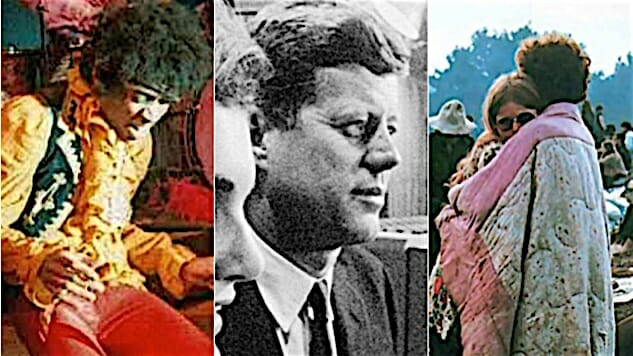
Taking into account the Civil Rights movement, the hippie movement, and increased domestic turbulence across the board, the ’60s in America was a kaleidoscopic experience. For every race riot or assassination, there was a cultural flowering of enormous proportions. Around the same time that all these world-shaking events occurred, cameras and filming equipment grew lighter and easier to transport allowing wannabe filmmakers to take to the streets. With the “Direct Cinema” movement, a new focus on rough realism brought the tumult of the ’60s to people’s homes in a new way.
Bookended by JFK’s traumatic assassination at the start and the terrible escalation of the Vietnam War toward the end, the ’60s were a decade of tremendous highs and violent lows. Thankfully, a lot of very talented documentarians were around to record everything. Here are a few of the finest.
1. Primary (1960)

The subject of this verite black-and-white doc is made plain by its title. The Democratic presidential candidate on the make, in this case, is none other than John F. Kennedy. As he campaigns against fellow Democratic contender Hubert Humphries, the camera follows Kennedy through throngs of cheering crowds, in nervous backrooms as poll results come in, and in small private moments with his wife, Jackie. Produced by Robert Drew and shot by Albert Maysles, this film provides a glimpse into the machinations of American politics of the era—but also into the cult of personality around JFK, who in only three years would be assassinated.
2. High School (1968)

Frederick Wiseman has always excelled at showing the nuts and bolts of the American institution, and what institution is more consuming than the American high school? He treats his subjects humanely and naturally and the school as its own kind of strange organism. The result is an unparalleled view of the hopes, fears, struggles and styles of American teens during a quickly-changing era. But it also takes care to depict the perspective of teachers and administrators within the Philly public school system, making the doc as even-handed as it is insightful.
3. Monterey Pop (1968)

D.A. Pennebaker was a giant of the American documentary form. His film about Bob Dylan, Dont Look Back, could just as easily slide into this list. But Monterey Pop Festival—taking place in California during the Summer of Love—seems an even more fitting tribute to the ’60s. Filmed on 16mm and with what was then state-of-the-art sound recording equipment, the result is a joyous and poppy exploration of the music scene and the counterculture of the West Coast.
Note on the 50th anniversary of the 1967 festival covered in Pennebaker’s seminal concert film, a newly restored version of the film (under the supervision of the director) will be shown in theaters. The film opens in New York on June 14, in Los Angeles on June 15, and throughout the nation June 16.
4. The Sixties (miniseries) (2014)

What more can you want than for Tom Hanks—Forrest Gump himself—to talk you through the major events of the decade? That’s what you get with this CNN-backed and Hanks-produced miniseries, consisting of 10 parts to cover most of the major bases from an American standpoint. Domestic protests, the British Invasion, the heightening of the Cold War and the Space Race all get their own dedicated episode, with expert historians and cultural figures to provide commentary. For a primer on the decade, look no further.
5. Woodstock (1970)

This Academy-Award winning doc covers the events and performers at the watershed Woodstock music festival in upstate New York. Featuring live footage of Janis Joplin, Jimi Hendrix and Jefferson Airplane, the hippie movement never looked or sounded any better. It has a long running time, but rest assured that you’re in good hands: it has the participation of a hyper-talented crew, featuring editing by the up-and-coming Martin Scorsese and Thelma Schoonmaker. The film has mutated over the years, being changed to add unseen crowd footage and musical performances from the cutting room floor. But whatever version you pick up is a fascinating and heady trip back to 1969.
Christina Newland is a writer on film and culture for VICE, Esquire, Sight & Sound, Little White Lies, and others. She’s a displaced New Yorker in love with ’70s Hollywood and boxing flicks.